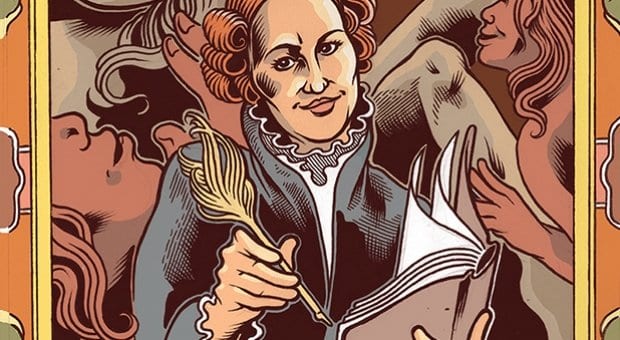I’m not ashamed to say it: recently, while snuggled up in my big tub with a cup of tea, I watched a lesbian melodrama. It was The Secret Diaries of Miss Anne Lister. I had just spent several days researching Lister and thought a drama based on her life would be a pleasant conclusion to my studies. I was disappointed that the film shows a one-dimensional Lister, motivated only by her lusts. The film seems to fall into a trap we might all easily fall into: reducing Lister to her many sexual exploits.
Lister (1791–1840) was born in the English town of Halifax, West Yorkshire. She inherited her family seat, Shibden Hall, in 1826 and worked hard to improve the property, including adding a Gothic tower and opening a successful coal mine. But what’s caught people’s attention most of all is the content of her diaries.
Most of the more than four million words she wrote deal with national events and her business and academic interests, but about a sixth of the diary was written in a code combining algebra, numbers and Greek. When eventually deciphered, it revealed a lifetime of lesbian desires and experiences. When she wrote “kiss,” it meant orgasm, “connection with the ladies” meant lesbianism, and “going to Italy” meant sex. She famously wrote, “I love & only love the fairer sex & thus beloved by them in turn, my heart revolts from any love but theirs.”
Her first experience was at boarding school, Manor House, with a girl named Eliza Raine. When Lister was 19 she began a sexual relationship with Isabella Norcliffe. In 1812, Norcliffe introduced Lister to Marianna Belcombe. Lister ditched Norcliffe for Belcombe, fell in love, but was distressed when Belcombe, because of family pressure and for financial reasons, married a widower named Charles Lawton. However, the two women didn’t stop seeing one another.
Lister considered herself married to Belcombe, but not monogamously, and soon resumed sleeping with Norcliffe. She also seduced at least one of Belcombe’s sisters, also named Anne. Lister wrote, “Talking … but then got more loving. Kissed her, told her I had a pain in my knees — my expression to her for desire — & saw plainly she liked me & would yield again, without much difficulty, to opportunity & importunity.” By 1824, Lister was also making frequent trips to Paris to see another of her partners, Maria Barlow.
In 1825, Lister and Belcombe had a sort of secret wedding. Lister wrote, “Marianna put me on a new watch riband & then cut the hair from her queer [genitals] & I that from mine, which she put each into the little lockets … for us always to wear under our clothes in mutual remembrance. We both of us kissed each bit of hair before it was put into the locket.”
It’s pleasantly steamy, but it’s easy to forget there’s anything beyond the steam. While her relationships are important in helping to show that she was living a lesbian life in a more modern sense, it’s not just her bed-hopping that now causes some to call her “the first modern lesbian.” Lister cultivated a mannish demeanour and maintained it in the face of the prejudice of her neighbours, who called her Gentleman Jack. When she was 27, she wrote, “The people generally remark, as I pass along, how much I am like a man … three men said as usual, ‘That’s a man’ & one asked ‘Does your cock stand?’” She describes her demeanour elsewhere in her journals: “Yet my manners are certainly peculiar, not all masculine but rather softly gentleman-like. I know how to please this fair maiden of mine.”
She not only “married” whom she pleased, but was fiercely independent and had an adventurous nature — oh, did I mention the mountains? While travelling with her final partner, Anne Walker, whom she also considered herself married to, Lister became the first woman to climb two mountains in the Pyrenees: Mont Perdu, in 1830, and Vignemale, in 1838. At a time when most lesbians were forced to hide themselves, and English tourists visited the mountains mainly to recuperate in resorts, Lister was setting records. I don’t remember seeing that in the film.
(History Boys appears on Daily Xtra on the first and third Tuesday of every month. You can
also follow them on Facebook.)


 Why you can trust Xtra
Why you can trust Xtra


